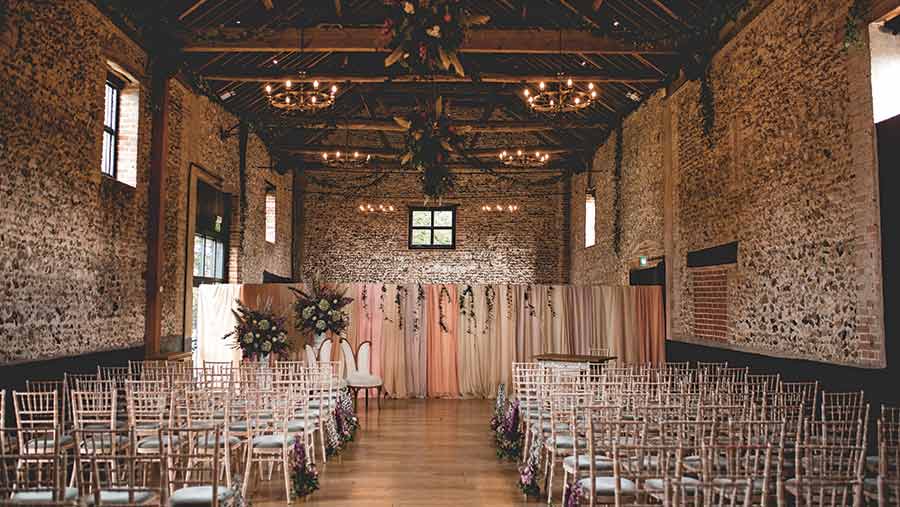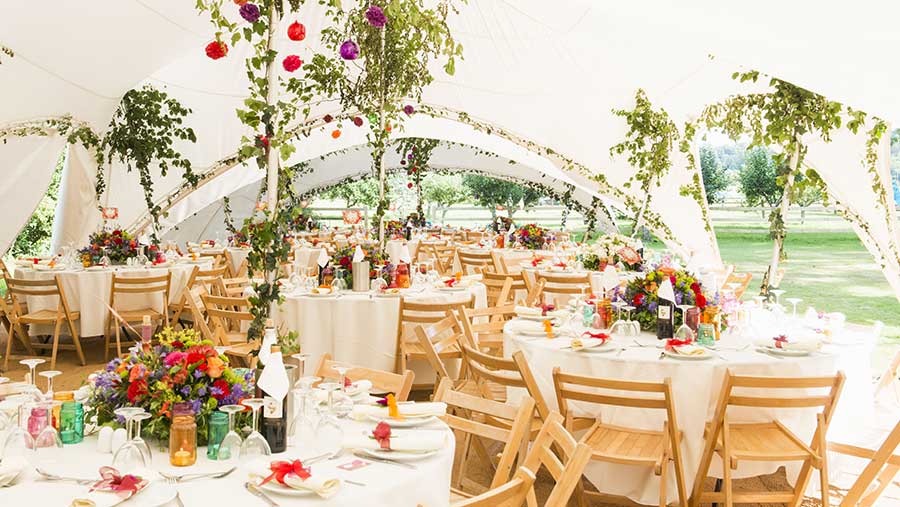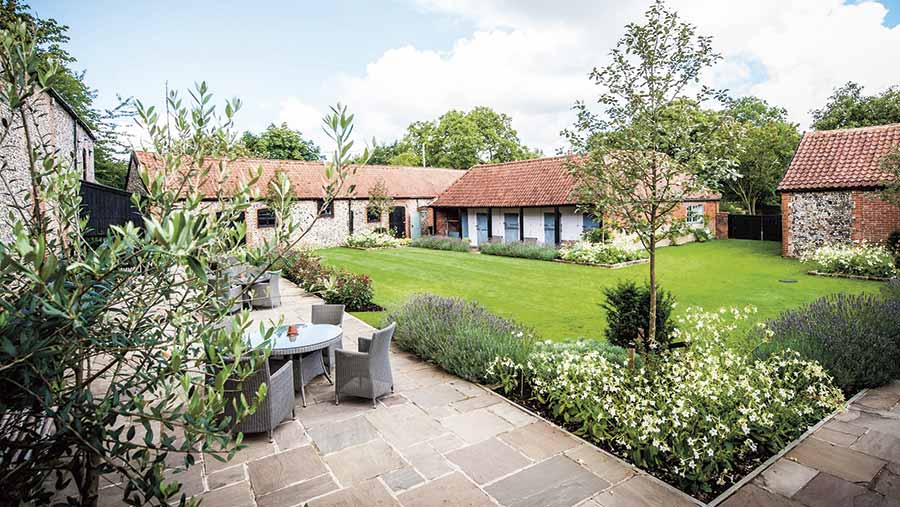So you want to… run a farm-based wedding venue
 Farm wedding venue
Farm wedding venue There is a constant stream of couples looking for that special place to tie the knot and, for many, a barn or marquee in the countryside is the dream location. Charles Loyd, partner in Strutt & Parker’s land management department, answers questions for those considering this form of diversification.
Combining a farm with a wedding venue is not without its challenges.
It requires considerable commitment and a skillset that might not come naturally to some farmers.
However, get it right and you can create a thriving enterprise with the potential to produce profits in excess of those made by the farm business.
See also: Know the VAT rules on events location hire
What’s the background to the wedding market?
According to the Office of National Statistics, each year around 250,000 couples marry in the UK and just over 70% choose a civil ceremony.
Surveys by bridal websites suggest that the average cost of a UK wedding is more than £25,000, with the venue usually one of the biggest expenses.
However, it is a competitive market, so do plenty of research.
Questions should include:
- Are there enough people in the area who will use your venue?
- Do you have a unique selling point that will encourage people to travel from further afield?
- What competition is there?
- Where do you want to sit in the market in terms of price?
- How comfortable you will be welcoming the public to your farm?
Be honest about the quality of your buildings and venue. One pitfall is to believe that your venue is better than it really is because you have an emotional attachment to it.
It’s very important to visit other venues and be aware of the quality of the offering you are up against.
What does the market want?
Anyone getting married on a farm is seeking rustic charm and a picturesque setting that they can enjoy with friends and family.
For some, that can mean a party venue, in the form of a marquee in a field, but others will be looking for something like a country house or converted barn.
The shift from religious to civil ceremonies means that customers are increasingly looking for venues that can provide them with a complete package – a place to get married, host a party and even stay before and after the event.
Offering a range of services will widen your appeal and ability to generate income. But you must have the right infrastructure, particularly at the top end of the market, including toilet facilities, good parking, wi-fi and manicured gardens for photographs.
Do I need planning permission?
Marquees can usually be erected without planning permission for up to 28 days a year.
However, this tends to limit operators to five or six events because the 28 days includes the time taken to set up and take down the marquee.

© REX/Shutterstock
Planning permission will be required to convert a redundant barn into a permanent venue, and traditional buildings might need listed building consent.
It is advisable to get a detailed specification of how the venue will look and operate before applying for planning permission, so you have answers to questions as they arise.
Planners will usually require noise surveys as part of the application process and may impose restrictions on the number of events and the time they must finish.
What licences are required?
Temporary Event Notices (TEN) cost £21 per event and cover anyone carrying out a “licensable activity”, such as selling alcohol and providing entertainment. They are available from the local council.
An event held under a TEN must last for no more than seven days and have fewer than 500 people attending (including staff).
A premises licence is needed for permanent venues and authorises the licence-holder to carry out various licensable activities at a specific location. The cost is £100-£1,905, depending on the rateable value of the venue.
One of the conditions of a premises licence is that a designated premises supervisor, with a personal licence to sell alcohol, must be appointed.
Personal licences cost £37 and the applicant must obtain a qualification that proves they are aware of licensing laws.
What about licences to carry out ceremonies?
To host a ceremony, the local council must give a “grant of approval” to hold civil marriages and civil partnerships. These last for three years.
The fee charged is at the discretion of the local authority, but typically ranges from £1,000 to £2,300.
What about health and safety issues?
Measures must be in place to ensure the health and safety of guests, which will include keeping visitors away from areas where there may be livestock or working machinery.
It is advisable to get in an external consultant to go through health and safety issues as this is a specialist area.
You are responsible for carrying out a fire risk assessment, which is reviewed regularly, with appropriate fire safety measures put in place.
You will need public liability insurance worth at least £10m and, if providing food, product liability insurance to cover you in the event of an outbreak of food poisoning.
All outside contractors, from caterers to DJs, should be pre-approved to confirm they have liability cover and the necessary experience to provide the level and quality of service required.
Is it realistic to run your own wedding venue?
To avoid the hassle of running the business day to day, it is possible to employ a specialist company to establish and manage the venue.
However, there are many examples where a family member has successfully taken responsibility for the business and employed additional wedding planners as it grows.
Critical skills required include being able to organise and manage staff, being flexible and showing attention to detail. The best approach is to manage people’s expectations on the run-up to the wedding and then over-deliver on the day.
Some people choose to offer the basic venue and allow couples to bring in approved contractors to provide the catering, typically charging the caterer a commission rate of 10-15% for the privilege.
A good wedding contract is essential. This should make clear what clients are getting for their money and what their responsibilities are.
How do you market the business?
Most people will research possible venues online so a professional website with excellent images is needed.
Testimonials are important to sell yourself. Be active on social media platforms like Facebook, Twitter and Instagram to develop the brand.
What are the financial and tax implications?
Scale is the key factor, but a fully operational venue with an established business should be aiming for a return of 25-30% before finance and rent.
Using a farm building as a permanent wedding venue takes it out of agricultural use so it becomes liable for business rates.
It will also exclude it from Agricultural Property Relief for Inheritance Tax purposes, although Business Property Relief should still be available.
Wedding venue checklist
- What demand is there locally and further afield?
- What’s the competition like – location, ambience, price?
- Special skills are needed – be realistic about whether you have these in the business
- Planning permission – temporary or permanent venue?
- Various licences will be needed for operation and ceremony
- Check financial and wide-ranging tax implications
- Health and safety and insurance need careful attention
- Don’t underestimate the importance of a good website
Case study

The Granary Estates wedding business will host 75 weddings in 2017 – despite only being in its fourth year of operation.
The enterprise is owned by Guy Taylor, who is also a partner in his family’s 400ha arable farm on the Suffolk/Cambridgeshire border.
He splits his time between the two businesses, which are run as separate entities.
Mr Taylor submitted a planning application to convert some old brick and flint buildings, previously rented out as storage, into a luxury wedding venue in March 2012. Permission was granted in July 2012.
The building work to install the necessary infrastructure, such as toilets and a glass walkway, which links two barns, was completed in March 2013.
“We took a bit of a gamble in that we started advertising before permission was granted and had 14 weddings booked before we finished the building. It was quite stressful as 2012 was a bad year and we were building through the winter in some horrible conditions.”
Hire costs start from £3,500 a day and for that couples get exclusive access to the venue, plus the support of an event manager to plan and run the day.
They hold a licence for ceremonies, can accommodate up to 175 guests and are starting to branch out into the corporate market. A small amount of accommodation is also available.
The development required an initial investment of around £500,000. Frustratingly, the business was offered grant funding but Mr Taylor was forced to turn it down because it would have delayed the building work.
Making subtle adjustments to the offering is proving important as the business develops, says Mr Taylor.
“We know that sometimes people worry if their friend has previously got married at the venue, so we try to tweak things to keep it feeling fresh and new.”
Mr Taylor now spends around 30% of his time on the weddings business and the rest on the farm.
He takes responsibility for maintenance, but delegates the day-to-day management of brides and guests to his specialist team of wedding planners. He employs five people full time and another 15 on a part-time basis, and believes the customer service they offer is crucial to their success.
“The venue sells itself, but the events team are key.
“It requires a fundamentally different skillset to farming, which we have had to learn as we go. You need to respond quickly to inquiries – if an email comes in, we answer it that day.”
The Granary Estates runs its own bars, and clients can choose from one of four approved caterers.
“Early on, we were more relaxed about people using other caterers, but we had some nightmares when people were left waiting for food. Our name is above the door and guests don’t always differentiate between us and the caterer. So it is about protecting our reputation.”
Mr Taylor says he took specialist advice on health and safety issues, but things were simplified by the farm operating from a different yard – the venue is based on a satellite unit, surrounded by 30ha of ground.
“If it was on the edge of a working farmyard it would be tricky. These were redundant buildings and we’ve designed it so people are contained.
“However, I have turned over the land around the venue to continuous wheat because oilseed rape is difficult for hayfever sufferers. I don’t grow beans there either because they look ugly and people like the photo opportunities provided by wheat.”
